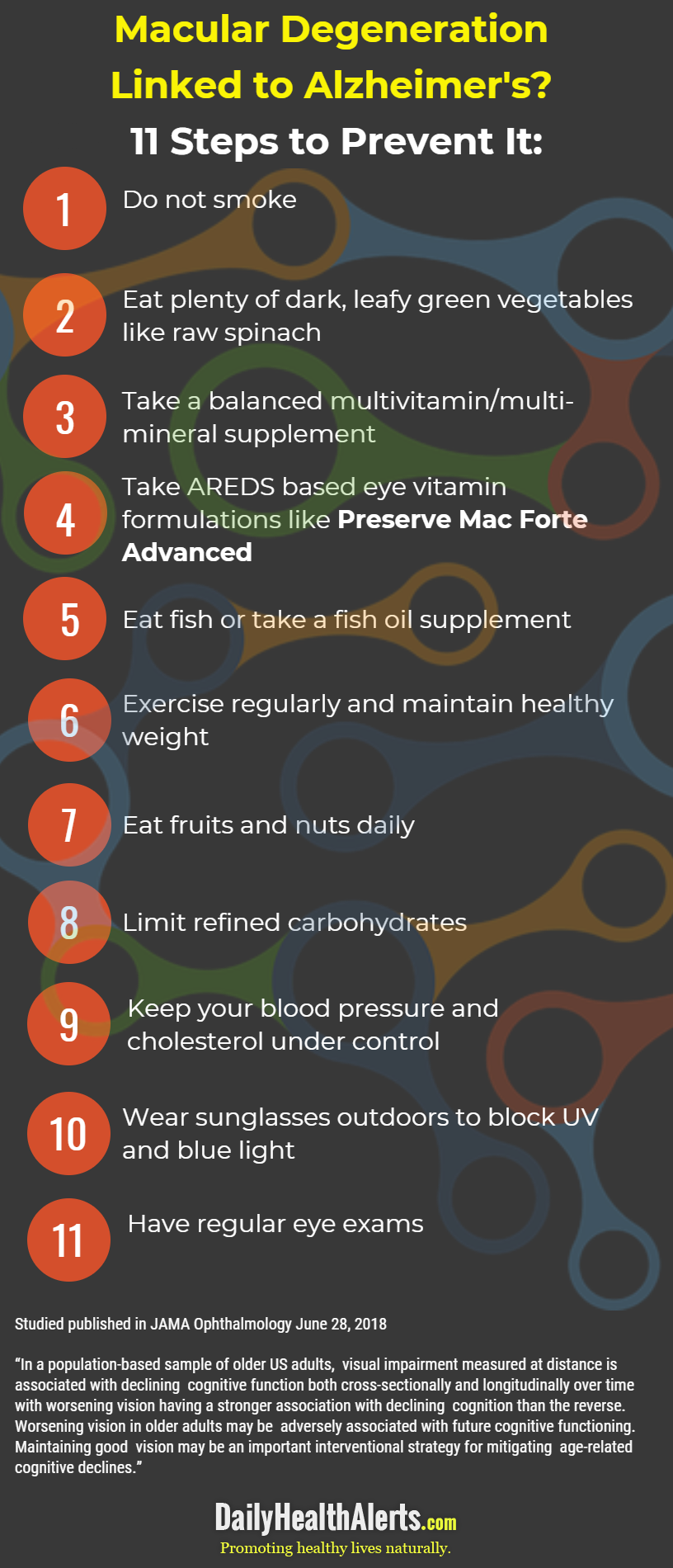Actor Anthony Hopkins once said, “Getting old ‘aint for the faint of heart.” He was most likely referring to all the trials and tribulations your body and mind may be confronted with as it breaks down. This includes the risk of developing macular degeneration, one of the leading causes of blindness in America today and/or Alzheimer’s/dementia disease, another major health crisis.
Recently, a new study found that maintaining healthy eyesight could also help prevent mental decline. This link may offer another clue to how preventative applications may work for a variety of health issues, not just one.

Some Stats
The statistical reports for AMD and Alzheimer’s are both highly concerning.
According to the American Academy of Ophthalmology,
“Nearly 2.1 million Americans age 50 and older have late AMD [age-related macular degeneration], the stage that can lead to severe vision impairment. In 2010, 9.1 million Americans had early AMD. By age 80, one in ten Americans has late AMD, which is more common in women than in men.”
Dementia and Alzheimer’s disease are also on the rise. The Alzheimer’s Association reports that,
“5.7 million Americans are living with Alzheimer’s. By 2020, this number is projected to rise to nearly 14 million…Every 65 seconds someone in the United States develops the disease.”
With these stats, anything to prevent such results should be a consideration. Now it looks as though the same preventative steps for both AMD and Alzheimer’s may help.
The Study
By making some simple changes in your daily routine when it comes to diet, exercise and eye protection, you just may be able to prevent macular degeneration and Alzheimer’s dementia disease at the same time.
In a recent study of 2,520 adults conducted by combined efforts of research from the University of Miami Miller School of Medicine, Johns Hopkins University School of Medicine, and the Human Development and Family Studies, Purdue University, a link between the two diseases was discovered.
Published in JAMA Ophthalmology (6/28/18),
“In a population-based sample of older US adults, visual impairment measured at distance is associated with declining cognitive function both cross-sectionally and longitudinally over time with worsening vision having a stronger association with declining cognition than the reverse. Worsening vision in older adults may be adversely associated with future cognitive functioning. Maintaining good vision may be an important interventional strategy for mitigating age-related cognitive declines.”
Now that a reputable, peer reviewed study has been published, the writing is on the wall for you to take heed. Sticking to a preventative protocol for AMD is more important than ever before. This even applies if you are already afflicted. Studies also show that specific dietary and exercise efforts after an AMD diagnosis may slow progression. One study addresses the importance of how more antioxidants could help.
Published in the Cochrane database of systematic reviews, a study by researchers at the Cochrane Eyes and Vision, ICEH, London School of Hygiene & Tropical Medicine reported that,
“It has been proposed that antioxidants may prevent cellular damage in the retina by reacting with free radicals that are produced in the process of light absorption. Higher dietary levels of antioxidant vitamins and minerals may reduce the risk of progression of age-related macular degeneration (AMD).”
Start a preventive program for AMD now. This could keep symptoms from occurring or reduce the rapid growth of macular degeneration and Alzheimer’s/dementia disease combined.
Preventative Steps for AMD
Conventional medicine can only offer a variety of “band-aid” approaches when it comes to AMD. This includes expensive and sometimes painful treatments such as pharmaceutical eye drops, oral medicines, injections and surgery. These approaches may help temporarily but it is the work you do on your own that could make a huge difference.
According to AllAbout Vision, below is a useful list, with researched proof, you can follow to take preventative steps to avoid or slow AMD.
These preventative steps for AMD are directly associated with helping prevent cognitive decline as well. This information is too important to ignore and too easy to avoid so start today. Look over the list and add whatever is missing in your life which, in time, may just enhance your life at the same time.